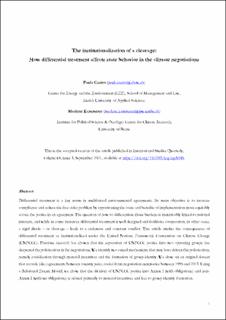Bitte benutzen Sie diese Kennung, um auf die Ressource zu verweisen:
https://doi.org/10.21256/zhaw-23566| Publikationstyp: | Beitrag in wissenschaftlicher Zeitschrift |
| Art der Begutachtung: | Peer review (Publikation) |
| Titel: | The institutionalization of a cleavage : how differential treatment affects state behavior in the climate negotiations |
| Autor/-in: | Castro Pareja, Paula Mónica Kammerer, Marlene |
| et. al: | No |
| DOI: | 10.1093/isq/sqab045 10.21256/zhaw-23566 |
| Erschienen in: | International Studies Quarterly |
| Band(Heft): | 65 |
| Heft: | 3 |
| Seite(n): | 683 |
| Seiten bis: | 698 |
| Erscheinungsdatum: | 2021 |
| Verlag / Hrsg. Institution: | Oxford University Press |
| ISSN: | 0020-8833 1468-2478 |
| Sprache: | Englisch |
| Fachgebiet (DDC): | 363: Umwelt- und Sicherheitsprobleme |
| Zusammenfassung: | Differential treatment is a key norm in multilateral environmental agreements. Its main objective is to increase compliance and reduce the free-rider problem by apportioning the costs and benefits of implementation more equitably across the parties in an agreement. The question of how to differentiate those burdens is inextricably linked to national interests, and while in some instances differential treatment is well designed and facilitates cooperation, in other cases a rigid divide—or cleavage—leads to a stalemate and constant conflict. This article studies the consequences of differential treatment as institutionalized under the United Nations Framework Convention on Climate Change (UNFCCC). Previous research has shown that the separation of UNFCCC parties into two opposing groups has deepened the polarization in the negotiations. We identify two causal mechanisms that may have driven this polarization, namely socialization through material incentives and the formation of group identity. We draw on an original dataset that records (dis)agreements between country pairs, coded from negotiation summaries between 1995 and 2013. Using a relational events model, we show that the division of UNFCCC parties into Annex I (with obligations) and non-Annex I (without obligations) is related primarily to material incentives and less to group identity formation. |
| URI: | https://digitalcollection.zhaw.ch/handle/11475/23566 |
| Volltext Version: | Akzeptierte Version |
| Lizenz (gemäss Verlagsvertrag): | Lizenz gemäss Verlagsvertrag |
| Gesperrt bis: | 2022-04-01 |
| Departement: | School of Management and Law |
| Organisationseinheit: | Zentrum für Energie und Umwelt (CEE) |
| Enthalten in den Sammlungen: | Publikationen School of Management and Law |
Dateien zu dieser Ressource:
| Datei | Beschreibung | Größe | Format | |
|---|---|---|---|---|
| 2021_Castro-Kammerer_Institutionalization-of-a-cleavage.pdf | Accepted Version | 3.54 MB | Adobe PDF |  Öffnen/Anzeigen |
Zur Langanzeige
Castro Pareja, P. M., & Kammerer, M. (2021). The institutionalization of a cleavage : how differential treatment affects state behavior in the climate negotiations. International Studies Quarterly, 65(3), 683–698. https://doi.org/10.1093/isq/sqab045
Castro Pareja, P.M. and Kammerer, M. (2021) ‘The institutionalization of a cleavage : how differential treatment affects state behavior in the climate negotiations’, International Studies Quarterly, 65(3), pp. 683–698. Available at: https://doi.org/10.1093/isq/sqab045.
P. M. Castro Pareja and M. Kammerer, “The institutionalization of a cleavage : how differential treatment affects state behavior in the climate negotiations,” International Studies Quarterly, vol. 65, no. 3, pp. 683–698, 2021, doi: 10.1093/isq/sqab045.
CASTRO PAREJA, Paula Mónica und Marlene KAMMERER, 2021. The institutionalization of a cleavage : how differential treatment affects state behavior in the climate negotiations. International Studies Quarterly. 2021. Bd. 65, Nr. 3, S. 683–698. DOI 10.1093/isq/sqab045
Castro Pareja, Paula Mónica, and Marlene Kammerer. 2021. “The Institutionalization of a Cleavage : How Differential Treatment Affects State Behavior in the Climate Negotiations.” International Studies Quarterly 65 (3): 683–98. https://doi.org/10.1093/isq/sqab045.
Castro Pareja, Paula Mónica, and Marlene Kammerer. “The Institutionalization of a Cleavage : How Differential Treatment Affects State Behavior in the Climate Negotiations.” International Studies Quarterly, vol. 65, no. 3, 2021, pp. 683–98, https://doi.org/10.1093/isq/sqab045.
Alle Ressourcen in diesem Repository sind urheberrechtlich geschützt, soweit nicht anderweitig angezeigt.